初中语文阅读理解100篇
(精品附答案)中考复习现代文阅读分类汇编之记叙文阅读训练100篇
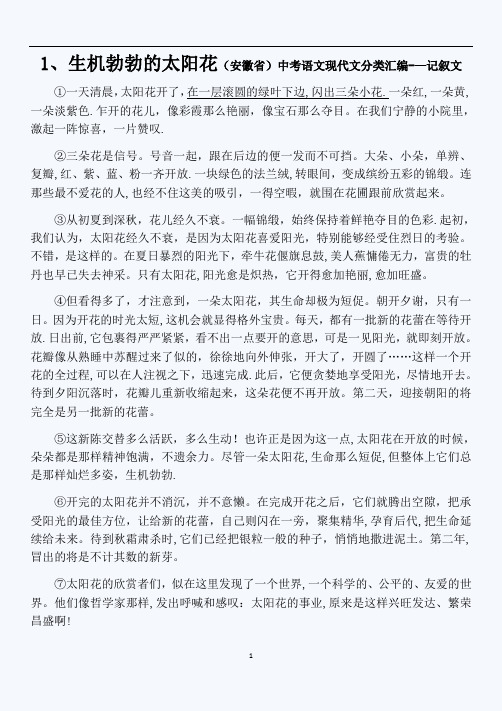
1、生机勃勃的太阳花(安徽省)中考语文现代文分类汇编-—记叙文①一天清晨,太阳花开了,在一层滚圆的绿叶下边,闪出三朵小花.一朵红,一朵黄,一朵淡紫色.乍开的花儿,像彩霞那么艳丽,像宝石那么夺目。
在我们宁静的小院里,激起一阵惊喜,一片赞叹.②三朵花是信号。
号音一起,跟在后边的便一发而不可挡。
大朵、小朵,单辨、复瓣,红、紫、蓝、粉一齐开放.一块绿色的法兰绒,转眼间,变成缤纷五彩的锦缎。
连那些最不爱花的人,也经不住这美的吸引,一得空暇,就围在花圃跟前欣赏起来。
③从初夏到深秋,花儿经久不衰。
一幅锦缎,始终保持着鲜艳夺目的色彩.起初,我们认为,太阳花经久不衰,是因为太阳花喜爱阳光,特别能够经受住烈日的考验。
不错,是这样的。
在夏日暴烈的阳光下,牵牛花偃旗息鼓,美人蕉慵倦无力,富贵的牡丹也早已失去神采。
只有太阳花,阳光愈是炽热,它开得愈加艳丽,愈加旺盛。
④但看得多了,才注意到,一朵太阳花,其生命却极为短促。
朝开夕谢,只有一日。
因为开花的时光太短,这机会就显得格外宝贵。
每天,都有一批新的花蕾在等待开放.日出前,它包裹得严严紧紧,看不出一点要开的意思,可是一见阳光,就即刻开放。
花瓣像从熟睡中苏醒过来了似的,徐徐地向外伸张,开大了,开圆了……这样一个开花的全过程,可以在人注视之下,迅速完成.此后,它便贪婪地享受阳光,尽情地开去。
待到夕阳沉落时,花瓣儿重新收缩起来,这朵花便不再开放。
第二天,迎接朝阳的将完全是另一批新的花蕾。
⑤这新陈交替多么活跃,多么生动!也许正是因为这一点,太阳花在开放的时候,朵朵都是那样精神饱满,不遗余力。
尽管一朵太阳花,生命那么短促,但整体上它们总是那样灿烂多姿,生机勃勃.⑥开完的太阳花并不消沉,并不意懒。
在完成开花之后,它们就腾出空隙,把承受阳光的最佳方位,让给新的花蕾,自己则闪在一旁,聚集精华,孕育后代,把生命延续给未来。
待到秋霜肃杀时,它们已经把银粒一般的种子,悄悄地撒进泥土。
第二年,冒出的将是不计其数的新芽。
初中语文100篇阅读理解专题训练(含答案)
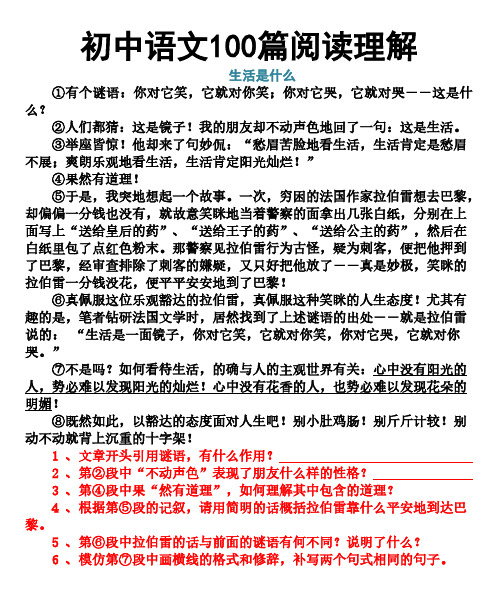
初中语文100篇阅读理解生活是什么①有个谜语:你对它笑,它就对你笑;你对它哭,它就对哭--这是什么?②人们都猜:这是镜子!我的朋友却不动声色地回了一句:这是生活。
③举座皆惊!他却来了句妙侃:“愁眉苦脸地看生活,生活肯定是愁眉不展;爽朗乐观地看生活,生活肯定阳光灿烂!”④果然有道理!⑤于是,我突地想起一个故事。
一次,穷困的法国作家拉伯雷想去巴黎,却偏偏一分钱也没有,就故意笑眯地当着警察的面拿出几张白纸,分别在上面写上“送给皇后的药”、“送给王子的药”、“送给公主的药”,然后在白纸里包了点红色粉末。
那警察见拉伯雷行为古怪,疑为刺客,便把他押到了巴黎,经审查排除了刺客的嫌疑,又只好把他放了--真是妙极,笑眯的拉伯雷一分钱没花,便平平安安地到了巴黎!⑥真佩服这位乐观豁达的拉伯雷,真佩服这种笑眯的人生态度!尤其有趣的是,笔者钻研法国文学时,居然找到了上述谜语的出处--就是拉伯雷说的:“生活是一面镜子,你对它笑,它就对你笑,你对它哭,它就对你哭。
”⑦不是吗?如何看待生活,的确与人的主观世界有关:心中没有阳光的人,势必难以发现阳光的灿烂!心中没有花香的人,也势必难以发现花朵的明媚!⑧既然如此,以豁达的态度面对人生吧!别小肚鸡肠!别斤斤计较!别动不动就背上沉重的十字架!1、文章开头引用谜语,有什么作用?2、第②段中“不动声色”表现了朋友什么样的性格?3、第④段中果“然有道理”,如何理解其中包含的道理?4、根据第⑤段的记叙,请用简明的话概括拉伯雷靠什么平安地到达巴黎。
5、第⑥段中拉伯雷的话与前面的谜语有何不同?说明了什么?6、模仿第⑦段中画横线的格式和修辞,补写两个句式相同的句子。
7、最后一段连用几个感叹号,有什么作用?8、读了本文,你认为生活还是什么?请运用比喻对它进行描摹。
地平线小的时候,我才从秦岭来到渭北大平原,最喜欢骑上自行车在路上无拘无束地奔驰。
庄稼收割了,又没有多少行人,空旷的原野上稀落着一些树丛和矮矮的屋。
【答案】初中语文阅读理解必备100篇
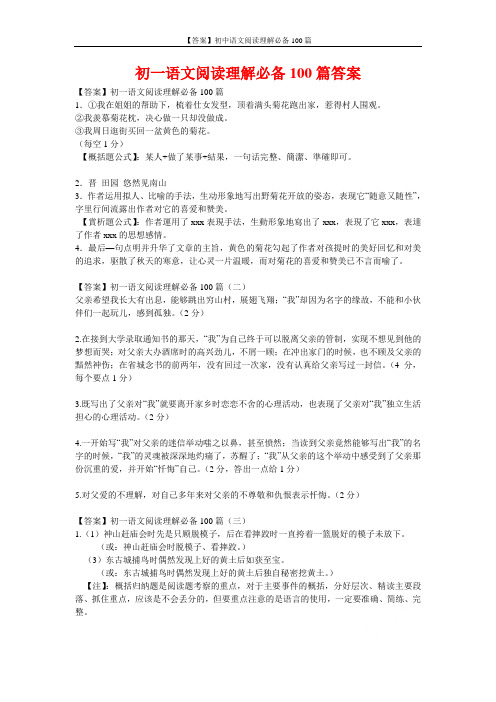
初一语文阅读理解必备100篇答案【答案】初一语文阅读理解必备100篇1.①我在姐姐的帮助下,梳着仕女发型,顶着满头菊花跑出家,惹得村人围观。
②我羡慕菊花枕,决心做一只却没做成。
③我周日逛街买回一盆黄色的菊花。
(每空1分)【概括題公式】:某人+做了某事+結果,一句话完整、簡潔、準確即可。
2.晋田园悠然见南山3.作者运用拟人、比喻的手法,生动形象地写出野菊花开放的姿态,表现它“随意又随性”,字里行间流露出作者对它的喜爱和赞美。
【賞析題公式】:作者運用了xxx表現手法,生動形象地寫出了xxx,表現了它xxx,表達了作者xxx的思想感情。
4.最后—句点明并升华了文章的主旨,黄色的菊花勾起了作者对孩提时的美好回忆和对美的追求,驱散了秋天的寒意,让心灵一片温暖,而对菊花的喜爱和赞美已不言而喻了。
【答案】初一语文阅读理解必备100篇(二)父亲希望我长大有出息,能够跳出穷山村,展翅飞翔;“我”却因为名字的缘故,不能和小伙伴们一起玩儿,感到孤独。
(2分)2.在接到大学录取通知书的那天,“我”为自己终于可以脱离父亲的管制,实现不想见到他的梦想而哭;对父亲大办酒席时的高兴劲儿,不屑一顾;在冲出家门的时候,也不顾及父亲的黯然神伤;在省城念书的前两年,没有回过一次家,没有认真给父亲写过一封信。
(4分,每个要点1分)3.既写出了父亲对“我”就要离开家乡时恋恋不舍的心理活动,也表现了父亲对“我”独立生活担心的心理活动。
(2分)4.一开始写“我”对父亲的迷信举动嗤之以鼻,甚至愤然;当读到父亲竟然能够写出“我”的名字的时候,“我”的灵魂被深深地灼痛了,苏醒了;“我”从父亲的这个举动中感受到了父亲那份沉重的爱,并开始“忏悔”自己。
(2分,答出一点给1分)5.对父爱的不理解,对自己多年来对父亲的不尊敬和仇恨表示忏悔。
(2分)【答案】初一语文阅读理解必备100篇(三)1.(1)神山赶庙会时先是只顾脱模子,后在看摔跤时一直挎着一篮脱好的模子未放下。
100篇初中生阅读题(含答案)
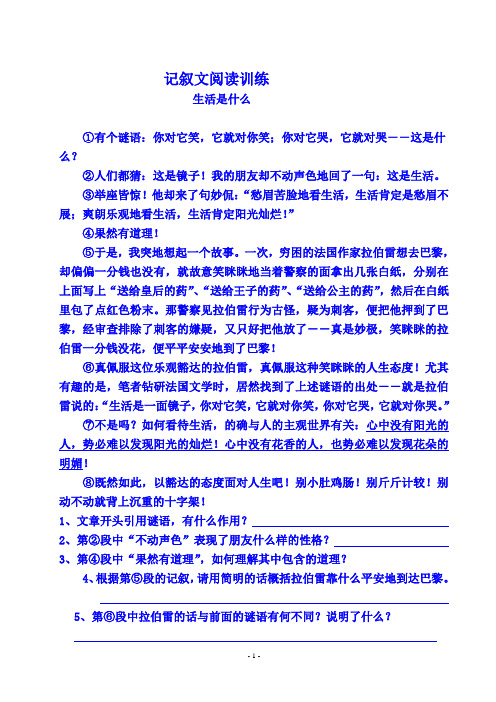
记叙文阅读训练生活是什么①有个谜语:你对它笑,它就对你笑;你对它哭,它就对哭--这是什么?②人们都猜:这是镜子!我的朋友却不动声色地回了一句:这是生活。
③举座皆惊!他却来了句妙侃:“愁眉苦脸地看生活,生活肯定是愁眉不展;爽朗乐观地看生活,生活肯定阳光灿烂!”④果然有道理!⑤于是,我突地想起一个故事。
一次,穷困的法国作家拉伯雷想去巴黎,却偏偏一分钱也没有,就故意笑眯眯地当着警察的面拿出几张白纸,分别在上面写上“送给皇后的药”、“送给王子的药”、“送给公主的药”,然后在白纸里包了点红色粉末。
那警察见拉伯雷行为古怪,疑为刺客,便把他押到了巴黎,经审查排除了刺客的嫌疑,又只好把他放了--真是妙极,笑眯眯的拉伯雷一分钱没花,便平平安安地到了巴黎!⑥真佩服这位乐观豁达的拉伯雷,真佩服这种笑眯眯的人生态度!尤其有趣的是,笔者钻研法国文学时,居然找到了上述谜语的出处--就是拉伯雷说的:“生活是一面镜子,你对它笑,它就对你笑,你对它哭,它就对你哭。
”⑦不是吗?如何看待生活,的确与人的主观世界有关:心中没有阳光的人,势必难以发现阳光的灿烂!心中没有花香的人,也势必难以发现花朵的明媚!⑧既然如此,以豁达的态度面对人生吧!别小肚鸡肠!别斤斤计较!别动不动就背上沉重的十字架!1、文章开头引用谜语,有什么作用?2、第②段中“不动声色”表现了朋友什么样的性格?3、第④段中“果然有道理”,如何理解其中包含的道理?4、根据第⑤段的记叙,请用简明的话概括拉伯雷靠什么平安地到达巴黎。
5、第⑥段中拉伯雷的话与前面的谜语有何不同?说明了什么?6、模仿第⑦段中画横线的格式和修辞,补写两个句式相同的句子。
7、最后一段连用几个感叹号,有什么作用?8、读了本文,你认为生活还是什么?请运用比喻对它进行描摹。
地平线小的时候,我才从秦岭来到渭北大平原,最喜欢骑上自行车在路上无拘无束地奔驰。
庄稼收割了,又没有多少行人,空旷的原野上稀落着一些树丛和矮矮的屋。
初中语文阅读理解必备100篇示范文

初中语文阅读理解必备100篇示范文初一语文阅读理解必备100篇(一)XXX,笔名XXX,紫色梅子。
江苏东台人。
职业:教师。
XXX会员。
XXX会员。
出版有散文集《且听风吟》、《忽然花开》、《每一棵草都会开花》等。
(《春风暖》被选为七年级上册语文活页课文链接)作品集《且听风吟》、《忽然花开》、《每一棵草都会开花》、《尘世里的初相见》、《诗经里的那些情事》、《爱,永远不会消失》等。
文章被选进《灵感与感动》等上百种文集。
多篇文章被设计成中考、高考语文现代文阅读题。
四川省凉山市20GG年语文中考试题菊有黄花丁立梅一场秋雨,再紧着几场秋风,菊开了。
菊在篱笆外开,这是最大众最经典的一种开法。
历来入得诗的菊,都是以这般姿势开着的。
一大丛一大丛的。
倚着篱笆,是篱笆家养的女儿,娇俏的,又是淡定的,有过日子的XXX。
()代XXX随口吟出那句“采菊东篱下”,几乎成了菊的名片。
以至后来的人一看到篱笆,就想到XXX。
XXX大概做梦也没想到,他能被人千秋万代地记住,很大程度上,得益于他家篱笆外的那一丛菊。
菊不朽,他不朽。
我所熟悉的菊,却不在篱笆外,它在河畔、沟边、田埂旁。
它有个算不得名字的名字:野菊花。
像过去人家小脚的妻,没名没姓,只跟着丈夫,被人称作XXX、XXX。
天地敞开,广阔无边,野菊花们开得随便又随性。
XXX的清秀不施粉黛,却色彩缤纷,红的黄的、白的紫的,万众一心、齐心合力地怒放着,仿佛是一群闹嚷嚷的小丫头,挤着挨着在看稀奇,小脸伸开,兴奋着,欣喜着。
乡人们见多了这样的花,不以为意,他们在秋天的原野上收获、播种,埋下来年的期盼。
菊花兀自开放、兀自欢笑。
与乡人各不相扰。
蓝天白云,天地绵亘。
小孩子们却没法置若罔闻,他们都有颗菊花般的心,顺其自然。
他们与菊亲密,采了它,到处乱插。
那时,家里土墙上贴着一张仕女图,有女子云鬓高耸,上面横七竖八插满菊,衣袂上亦沾着菊,极美。
掐了一捧野菊花回家的姐姐,突发奇想帮我梳头,照着墙上仕女的样子。
中考语文阅读理解经典阅读100篇上——记叙文、说明文、议论文(前50篇)
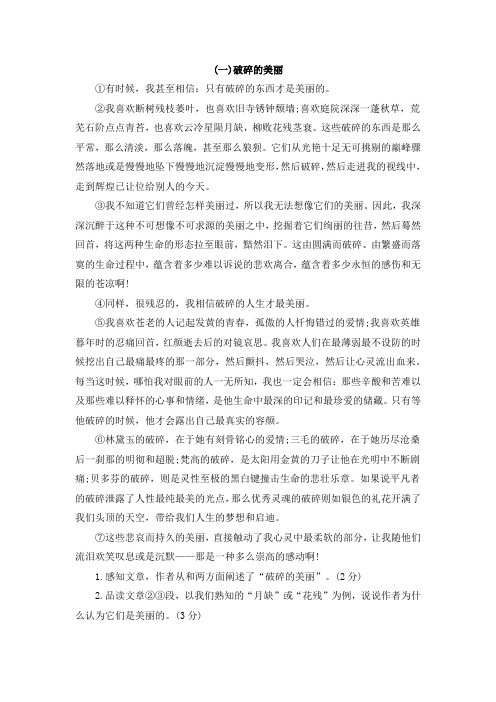
(一)破碎的美丽①有时候,我甚至相信:只有破碎的东西才是美丽的。
②我喜欢断树残枝萎叶,也喜欢旧寺锈钟颓墙;喜欢庭院深深一蓬秋草,荒芜石阶点点青苔,也喜欢云冷星陨月缺,柳败花残茎衰。
这些破碎的东西是那么平常,那么清淡,那么落魄,甚至那么狼狈。
它们从光艳十足无可挑剔的巅峰骤然落地或是慢慢地坠下慢慢地沉淀慢慢地变形,然后破碎,然后走进我的视线中,走到辉煌已让位给别人的今天。
③我不知道它们曾经怎样美丽过,所以我无法想像它们的美丽。
因此,我深深沉醉于这种不可想像不可求源的美丽之中,挖掘着它们绚丽的往昔,然后蓦然回首,将这两种生命的形态拉至眼前,黯然泪下。
这由圆满而破碎、由繁盛而落寞的生命过程中,蕴含着多少难以诉说的悲欢离合,蕴含着多少永恒的感伤和无限的苍凉啊!④同样,很残忍的,我相信破碎的人生才最美丽。
⑤我喜欢苍老的人记起发黄的青春,孤傲的人忏悔错过的爱情;我喜欢英雄暮年时的忍痛回首,红颜逝去后的对镜哀思。
我喜欢人们在最薄弱最不设防的时候挖出自己最痛最疼的那一部分,然后颤抖,然后哭泣,然后让心灵流出血来。
每当这时候,哪怕我对眼前的人一无所知,我也一定会相信:那些辛酸和苦难以及那些难以释怀的心事和情绪,是他生命中最深的印记和最珍爱的储藏。
只有等他破碎的时候,他才会露出自己最真实的容颜。
⑥林黛玉的破碎,在于她有刻骨铭心的爱情;三毛的破碎,在于她历尽沧桑后一刹那的明彻和超脱;梵高的破碎,是太阳用金黄的刀子让他在光明中不断剧痛;贝多芬的破碎,则是灵性至极的黑白键撞击生命的悲壮乐章。
如果说平凡者的破碎泄露了人性最纯最美的光点,那么优秀灵魂的破碎则如银色的礼花开满了我们头顶的天空,带给我们人生的梦想和启迪。
⑦这些悲哀而持久的美丽,直接触动了我心灵中最柔软的部分,让我随他们流泪欢笑叹息或是沉默——那是一种多么崇高的感动啊!1.感知文章,作者从和两方面阐述了“破碎的美丽”。
(2分)2.品读文章②③段,以我们熟知的“月缺”或“花残”为例,说说作者为什么认为它们是美丽的。
精选中考阅读理解100篇附答案

精选中考阅读理解100篇附答案-CAL-FENGHAI-(2020YEAR-YICAI)_JINGBIAN精选中考阅读理解100篇附答案1-20(1) The Weather (选自广州)In winter the weather in England is often very cold. In spring and autumn there are sometimes cold days, but there are also days when the weather is warm. Theweather is usually warm in summer. It is sometimes hot in summer, but it is notoften very hot. There are often cool days in summer.When the temperature is over 27℃, English people say it is hot. When the temperature is about 21℃, they say it is warm.In the north of Europe it is very cold in winter. In the south of Europe the summer is often very hot. In the south of Spain(1)and in North Africa(2)the summer isalways hot.Water freezes(3)at 0℃. When water freezes, it changes from a liquid(4)into ice.Water boils(5) at 100℃. When water boils, it changes from a liquid into steam(6).Notes: (1)Spain/speIn/n. 西班牙(2)Africa/`frIk/n.非洲(3)freeze/fri:z/v.结冰(4)liquid/`lIkwId/n.液体(5)boil/bIl/v.沸腾;(水)开(6)steam/sti:m/n.蒸汽1.What is the weather like in summer in EnglandA.Very hot.B.Warm.C.Cool.D.Both A and C.2.What do you think “the north of Europe" means?A.A part of a country.B.The capital of Europe.C.A country in the north of Europe.D.A part of Europe.3.When water freezes, it changes from into.A.water, iceB.water, steamC.steam, iceD.ice, water4.The writer wants to tell us something about.A.the weather in EuropeB.the weather in EnglandC.some knowledge of the temperatureD. three states of water答案:1—4 DDAC(2) The Artist and the Beggar(1)(选自成都)An artist was coming home by train one day. He hadn’t much money but was very kind.He gave his last few coins(2) to a beggar, but he saw another one, and forgotthat he didn’t have any money in his pockets. He asked the man if he liked tohave lunch with him, and the beggar, of course, agreed. So they went into a smallrestaurant and had a good meal.In the end, the artist could not pay the bill(3), and the beggar had to do so. The artist felt very sorry for it, so he said to the beggar, “Come home with me in a taxi, myfriend. And I’ll give you the money for our lunch."“Oh, no!" the beggar answered quickly. “I had to pay for your lunch, but I’m not going to pay for your taxi home!"Notes: (1)beggar/`beg/ n.乞丐(2)coin/kIn/n. 硬币(3)bill /bIl/n.帐单1.What kind of man was the artist?2.What did he do to the first beggar?3.What did the artist forget when he invited another beggar to have lunch with him?4.Who paid for the meal?5.What did the artist want to do at last?6.Why didn’t the beggar go home with the artist?答案:1.The artist is a kind man.2.He gave his last few coins to the first beggar.3.He forgot that he had no money then.4.The beggar paid for the bill.5.He wanted to return the beggar the money when he got home.6.Because he wouldn’t pay for the taxi.(3) A Common Language (选自陇南)There is a common(1) language popular in every country in the world. All the people, old and young, men and women, must use it.It’s everybody’s second language. It’s easy to learn, though(2) you don’t hear it.It’s sign language(3).When you wave to a friend, you are using sign language. When you smile at someone, you mean to be friendly. When you put up your hand in class, you are saying, “Pleaseask me. I know the correct answer." When you put your finger in front of yourmouth, you mean “Be quiet." The deaf use sign language to talk to each other.There is even a university for the deaf in the United States. There are also TVprogrammes for the deaf people. They use sign language to tell everybody.Notes: (1)common/`kmn/adj. 共同的(2)though/u/ conj. 尽管(3)sign language 手势语(4)wave/weIv/ v. 挥手1.E uses sign language.2.Sign language is not d, so we can learn it.3.Most people who can s use sign language, too.4.If someone smiles at you, it means he/she is friendly t you.5.If you can a a question, you should put up your hand first.6.You put your finger in front of your mouth if you want someone not to sanything.7.The deaf can talk to each other w sign language.8.Some A deaf people can learn sign language in the university.答案:1.Everyone 2.difficult 3.speak 4.to 5.answer 6.say 7.with 8.American(4) Tom Broke a Plate or a Gold Watch? (选自辽宁)It was Sunday and Tom was staying at home. After breakfast he went out into the garden and played quietly by himself. There were no kids around and he was used to(1)playing alone quietly. He played with Bobby, the dog. He climbed up and down thetree. Sometimes a bird would come down to perch(2) on top of the doghouse.Then Tom would have the greatest fun(3) by throwing a stone or something at it.Though he never made it, he did like doing this kind of thing.Now Tom had been in the garden for half an hour. Suddenly a crack(4) was heard and the little boy began crying.“What’s the matter,Tom"his mother looked through the kitchen(5) window. Tom ran into the kitchen.“Mum," he sobbed(6). "I broke Bobby’s plate. I didn’t know it was so fragile (7)."His mother put her arms round him and said, “Don’t feel so sad, Tom. We have other plates for Bobby. But how did you break that one"“I threw it at a bird but missed, and it went straight to the plate."In Tom’s hand was his father’s gold pocket watch(8)!Notes: (1)be used to 习惯于(2)perch/p:t/n. 停歇(3)fun/fn/n. 爱好(4)crack /crk/n. 破碎声(5)kitchen/`kItn/n. 厨房(6)sob/sb/v. 抽泣(7)fragile/`frdaIl/adj. 易碎的(8)gold pocket watch 金怀表1.When did the story happen?A.On a Sunday afternoon.B.On a Sunday morning.C.At noon.D.In the evening.2.When a bird perched on top of the doghouse,Tom.A.would like to play with itB.was very interested in it by throwing a stone at itC.would like to give it something to eatD.would smile3.There were no kids around and he was used to playing alone quietly. Here“kids"means.A.menB.dogsC.childrenD.birds4.How long had Tom been in the garden when his mother heard him cry?A.An hour.B.A day.C.Two hours.D.Half an hour.5.“Though he never made it" means“".A.Though he couldn’t hit a bird with a stone or somethingB.Though he couldn’t catch the birdC.Though he couldn’t have fun from the birdD.Though he couldn’t eat the bird答案:1—5 BBCDA(5) EatingAn important question about eating out is who pays for the meal. If a friend of yours asks you to have lunch with him, you may say something like this,“I’m afraidit’ll have to be someplace cheap, as I have very little money." The other personmay say,“O K, I’ll meet you at McDonald’s."This means that the two agree to go Dutch, that is, each person pays for himself. He may also say,“Oh, no. I want to take you to lunch at Smith’s," or“I want you to trythe Chinese dumplings there. They’re great." This means the person wants to payfor both of you. If you feel friendly towards this person, you can go with him andyou needn’t pay for the meal. You may just say,“Thank you. That would be verynice."American customs(1) about who pays for dates(2) are much the same as in other parts of the world. In the old days, American women wanted men to pay for all themeals. But, today, a university(3) girl or a woman in business world will usuallypay her way during the day. If a man asks her for a dance outside the working hours,it means “Come, as my guest(4).” So as you can see, it is a polite thing tomake the question clear at the very beginning.Notes:(1)custom/`kstm/n. 风俗(2)date/deIt/n.约会(3)university/、ju:nI`v:sItI/n. 大学(4)guest/gest/n. 客人1.The passage tells us.A.how to eat outB.where to eat outC.what to eat outD.who pays for the meal2.If you have little money,.A.you’ll have a cheap mealB.you’ll borrow some from othersC.you’ll ask your friend to pay for your mealD.you won’t want your friends to ask you to dinner3.“Go Dutch" in this passage means.A.去饭馆B.就餐C.订餐D.各自付款4.Sometimes your friend takes you to lunch. It means.A.he’s going to lend some money to youB.he’s going to pay for your meal, to oC.he’ll be angry with youD.he can’t understand you5.In America,some girls and women now.A.ask men to pay for their mealsB.try to pay for the men’s mealsC.try to pay for their own mealsD.never have anything outside答案:1—5 DADBC阅读理解(6)Most children like watching TV.It’s very interesting.By(1) watching TV they can see and learn a lot and know many things about their country and the world.Ofcourse,they can also learn over the radio.But they can learn better and more easilywith TV.Why?Because they can hear and watch at the same time.But they can’t seeanything over the radio.TV helps to open children’s helps to open their minds(2),too.They learn newer and better ways of doing things.They may find the world is now smaller thanbefore.Many children watch TV only on Saturday or Sunday evening.They are always busy with their lessons.But a few children watch TV every night.They go to bed very late.Theycan’t have a good rest.How about you,my young friends?Notes:(1)by/baI/prep.通过(2)minds/maIndz/n.智力1.A few children go to bed late because they.A.are busy with their lessonsB.do their homeworkC.watch TVD.listen to the radio2.Children can’t see anything.A.in the radioB.on the radioC.on TVD.by watching TV helps to open children’s.A.eyes and mindsB.mindsC.eyes or mindsD.eyes4.children watch TV only on Saturday or Sunday evening.A.A lotB.MuchC. A lot ofD.A little5.Children can study better and more easily with TV because.A.they like to watch TVB.they can hear at the same timeC.they can watch at the same timeD.they can listen to and see something at the same time参考答案:1.C 2.B 3.A 4.C 5.D阅读理解(7)John was ten years old and he was very lazy[1].He had to go to school,of course,but he was bored[2]there and tried to do as little work as possible.His father and motherwere both doctors and they hoped that he would become one,too,when he grewup.But one da y John said to his mother,“When I finish school, I want to become agarbage collector[3].”“A garbage collector?”his mother asked .She was very surprised.“That’s not a pleasant job.Why do you want to become a garbage collector?”“Because then I’d only have to work one day a week,”John answered.“Only one day a week?”his mother said,“What do you mean?”“Well,”John answered,“I know that the ones who come to our house only work on Wednesday,because I only saw them on that day.”Notes:[1]lazy/leIzI/adj.懒的 [2]bored/bd/adj.厌烦 [3]garbage collector 垃圾工1.John at school.A.didn’t do any workB.did much workC.did very little workD.tried to finish his work2.John’s parents wanted him to become.A.a garbage collectorB.a doctorC.a teacherD.a worker3.John hoped to be a garbage collector because.A.he knew it was an important and necessary jobB.he thought he would work only one day a weekC.he often saw some garbage collectors come to his houseD.the garbage collectors really work only one day a week4.John thought that the garbage collectors only work one day a week because.A.it was a ruleB.some garbage collectors told him soC.his parents told him soD.he saw them work only on Wednesday参考答案:1.C 2.B 3.B 4.D阅读理解(8)Bill and Fred studied at a university and they were friends. They didn’t have much money, so when it was time for their holidays, Fred said, “Let’s take our holidaysin a trailer[1], Bill. It’s cheaper than a hotel. I can borrow my father’s trailer.”Fred was very happy. So they got into the trailer and began their holidays. They wanted to get up early the next day to go fishing, but they didn’t have an alarm[1] clock.“That’s all right, Bill," Fred said. “I’ll put these pieces of bread on the roof[3] of the trailer tonight and they’ll wake us up in the morning." Bill was very surprised,but he didn’t say anything.Fred was right. As soon as it began to get light, small birds came down to eat the bread, and their noise on the roof of the trailer woke Bill and Fred up very quickly.Notes:[1]trailer/`treIl/ n. 活动房屋式的拖车 [2]alarm/`la:m/ n. 警报 alarm clock 闹钟[3]roof/ru:f/ n. 顶;房顶1.Bill and Fred were both university s.2.The two young men decided to go t during their summer holidays.3.The two young men tried to s some money,so they borrowed a trailer.4.The two young men wanted to get up, but they were a to wake up too late thenext morning.5.Fred had a good i.6.Bill didn’t know w his friend put some bread on the top of the trailer.7.The next morning, the birds found the bread and flew to e it.8.In fact, the b woke the two young men up.9.The birds began to look for f as soon as it got light.10.Fred was very c.参考答案:1.students 2.traveling 3.save 4.afraid 5.idea 6.why 7.eat 8.birds 9.food 10.clever阅读理解(9)Some children think writers are great and they can tell people a lot. So they also wish to be writers some day. They mean that they want to write stories or books whichmany persons will read. I would like to remind[1] them that they will need to begood readers and to read a lot in order to[2] be good writers.Nearly all great writers read too long before they started to school, and read for hours and hours every day since they became good readers. Instead of watching TV in theevening, they spend much of their spare[3] time reading books.If you are a good reader, it won’t take you long to do the reading homework your teacher asks you to do. Then you will have time to read other books for fun.Because you read so well, you keep looking for more books to read.While making up your mind[4] to become a good writer, you had better say to yourself,“I must read more and more if I am really to become a good writer."Notes:[1]remind/rI`maInd/v. 提醒 [2]in order to 为了 [3]spare /spe/adj. 多余的 [4]make up one’s mind 下决心1.Some of the children like the g writers.2.The writer told the children to read m before they hope to be writers.3.A lot of writers l a lot from other writers' books and stories.4.For a student, he or she should do the reading homework well f.5.Doing much good reading can h you to be a good writer.参考答案:1.great 2.more 3.learned 4.first 5.help阅读理解(10)Australia is one of the greatest islands in the world.It is a little smaller than China.It is in the south of the earth.So when there is hot summer in our country,it is cold winterin Australia.Australia is big,but the population[1] has small.The population of Australia is the same as that of Shanghai,a city in China.Australia is famous for its sheep and kangaroos[2].After a short drive from any town,you will find yourself in the middle of white sheep,sheep,sheep,everywhere aresheep.Have you seen a kangaroo?It has a “bag” in its body.The mother kangarookeeps its ba by kangaroo in the “bag”.It is very interesting,isn’t it?Notes:[1]population /、ppjuleIn/n.人口 [2]kangaros /、kg`ru:/n.袋鼠根据短文内容判断正(√)、误(×)。
七年级阅读理解训练题(100篇)
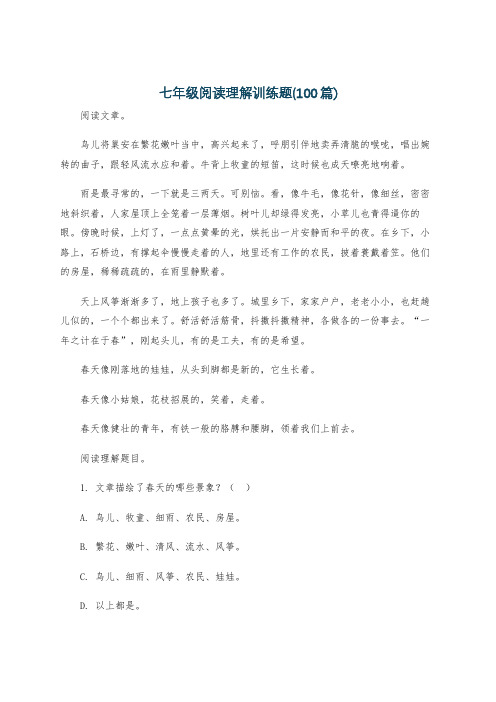
七年级阅读理解训练题(100篇)阅读文章。
鸟儿将巢安在繁花嫩叶当中,高兴起来了,呼朋引伴地卖弄清脆的喉咙,唱出婉转的曲子,跟轻风流水应和着。
牛背上牧童的短笛,这时候也成天嘹亮地响着。
雨是最寻常的,一下就是三两天。
可别恼。
看,像牛毛,像花针,像细丝,密密地斜织着,人家屋顶上全笼着一层薄烟。
树叶儿却绿得发亮,小草儿也青得逼你的眼。
傍晚时候,上灯了,一点点黄晕的光,烘托出一片安静而和平的夜。
在乡下,小路上,石桥边,有撑起伞慢慢走着的人,地里还有工作的农民,披着蓑戴着笠。
他们的房屋,稀稀疏疏的,在雨里静默着。
天上风筝渐渐多了,地上孩子也多了。
城里乡下,家家户户,老老小小,也赶趟儿似的,一个个都出来了。
舒活舒活筋骨,抖擞抖擞精神,各做各的一份事去。
“一年之计在于春”,刚起头儿,有的是工夫,有的是希望。
春天像刚落地的娃娃,从头到脚都是新的,它生长着。
春天像小姑娘,花枝招展的,笑着,走着。
春天像健壮的青年,有铁一般的胳膊和腰脚,领着我们上前去。
阅读理解题目。
1. 文章描绘了春天的哪些景象?()A. 鸟儿、牧童、细雨、农民、房屋。
B. 繁花、嫩叶、清风、流水、风筝。
C. 鸟儿、细雨、风筝、农民、娃娃。
D. 以上都是。
答案:D。
解析:文章中依次描写了鸟儿的欢唱、牧童的短笛、细密的春雨、劳作的农民、稀稀疏疏的房屋,还有天上的风筝等,选项 A、B、C 所列举的景象都包含在其中,所以选择 D。
2. 文中把春天比作了()A. 刚落地的娃娃、小姑娘、健壮的青年。
B. 美丽的花朵、可爱的孩子、慈祥的老人。
C. 温柔的母亲、调皮的小孩、勇敢的战士。
D. 以上都不是。
答案:A。
解析:文章最后三段分别把春天比作刚落地的娃娃、小姑娘、健壮的青年,形象地展现了春天的新、美、力的特点。
3. 下列对“人家屋顶上全笼着一层薄烟”一句理解正确的是()A. 写出了雨的密集。
B. 写出了烟雾的浓重。
C. 写出了屋顶的破旧。
D. 写出了天色的昏暗。
- 1、下载文档前请自行甄别文档内容的完整性,平台不提供额外的编辑、内容补充、找答案等附加服务。
- 2、"仅部分预览"的文档,不可在线预览部分如存在完整性等问题,可反馈申请退款(可完整预览的文档不适用该条件!)。
- 3、如文档侵犯您的权益,请联系客服反馈,我们会尽快为您处理(人工客服工作时间:9:00-18:30)。
初中语文阅读理解100篇一桶水我有事到楼上找刘阿姨,正好要小便,就在他家上了一次厕所.我发现,马桶水箱旁边备有一桶水.我猜想,这肯定是一桶洗过菜或衣服的水,刘阿姨舍不得倒掉,留下来冲厕所用.她真够节约的,我知道她有两个孩子读大学,需要很多钱,自己生活又不富裕,难怪几分钱都不放过.真可怜.说实话,看了那桶水后,刘阿姨在我心理的形象还真少了许多呢.又过了一些天,我到楼下林阿姨家去.巧得很,我在林阿姨家又要小便,不得不到她家的厕所去方便一下,我发现,林阿姨家的厕所也备有一桶水.林阿姨是一个非常富有的人,她的财产最少有几百万,不可能为节约几分钱特意准备一个水桶.我百思不得其解地问:“林阿姨,你怎么装一桶水放在厕所里?”林阿姨说:“那是中午或晚上休息后冲厕所用的。
不知为什么,水箱抽水时特别响,跟牛叫似的,我怕影响楼上楼下的邻居休息。
”我正好夹在林阿姨和刘阿姨之间,确实无数次听到过两家的抽水声,但从不在中午和晚上睡觉后听到过。
我自己,却有半夜上厕所的习惯,几乎每天深夜都要上一次厕所,冲一次马桶。
在那静静的夜晚,我多少回惊醒过两家的美梦啊!1、解释词语方法很多,联系上下文谈谈自己对下面词语的理解,并用词语写一句话或几句话。
①解释:百思不得其解②写话:2、能根据课文内容提一个有价值的、值得思考的问题,并回答这个问题。
3、“说实话,看了那桶水后,刘阿姨在我心里的形象还真小了许多呢。
”这是我开始对刘阿姨的印象,读了短文后你对刘阿姨有了新的认识,请你描绘一下你心目中刘阿姨的新形象。
4、一次来到刘阿姨或林阿姨家,你会对她说些什么?5、根据故事的发展,把文章的结尾补充完整,写在文章后面的横线上。
考晚上,我们全家在门前场地上乘凉。
忽然,爸爸笑着对我说:“小玲,我考你几个问题,回答得( )要准确,( )要迅速,好吗?”“好!”我爽快地答应。
心想,自己是高年级的学生了,能不会回答吗?爸爸问:“一斤棉花和一斤铁哪个重?”我眼皮一翻,高声答道:“铁重!”“哈哈……”一旁的妈妈、哥哥都笑了起来。
我一愣,正在犹豫,爸爸又提醒道:“注意,我问的是一斤棉花和一斤铁哪个重?”我连忙改口说:“一样重?”妈妈说:“对了,要听清问话。
”爸爸又考了:“那么,一立方米的棉花和一立方米的铁哪个重?”这回我特别听清了“一立方米”几个字,“一样重”。
“哈哈……”大家又笑了。
我抓了抓头,想了想,恍然大悟道:“哦,这回是铁重。
”接着,哥哥也来考我了:“一斤棉花和一斤铁哪个体积大?”我吸取了前两次的教训,盘算了一会说:“棉花体积大!”“为什么?”爸爸追着问。
“因为一斤铁的体积只有一小块,一斤棉花的体积比它大多了!”大家听了,满意地笑了。
这时,爸爸语气平静地说:“()遇到什么问题,( )要认真思考;( )是很容易的,( )应该好好想一想,否则会闹出笑话。
”我点了点头笑了。
1.在括号里填上适当的关联词。
2.给下面带点词选择合适的解释条。
(在括号内写上序号)闹:①不安静②吵、扰乱③干、弄(1) 否则会闹出笑话。
( )(2) 方塔街是我市的闹市区。
( )乘:①坐②在数与数之间进行乘法运算③利用(1) 我们全家在门前场地上乘凉。
( ) (2) 我们一起乘车去公园吧。
( ) 3.联系短文回答问题。
(1) “我吸取了前两次的教训,盘算了一会说”句中的“两次教训”是指①②(2)最后一节里,爸爸教育我,说了两层意思:一是二是一枚硬币两个年轻人一同寻找工作,一个是英国人,一个是犹太人。
一枚硬币躺在地上,英国青年看也不看他走了过去,犹太青年却激动地将它捡起。
英国青年对犹太青年的举动露出鄙夷之色:一枚硬币也捡,真没出息。
犹太青年望着远去的英国青年心生感慨:让钱白白地从身边溜走,真没出息。
两个人同时走进一家公司。
公司很小,工作很累,工资也低,英国青年不屑一顾地走了,而犹太青年却高兴地留了下来。
两年后,两人在街上相遇,犹太青年已成了老板,而英国青年还在寻找工作。
英国青年对此不可理解,说:“你这么没出息的人怎么能这么快就‘发’了?”犹太青年说:“因为我没像你那样绅士般地从一枚硬币上迈过去。
你连一枚硬币都不要,怎么会发大财呢?”英国青年并非不要钱,可他眼睛盯着的是大钱而不是小钱,所以他的钱总在明天。
这就是问题的答案。
1、这样有深刻含义的文章我读得懂:对待一分钱,英国青年__________________________,犹太青年______________________。
结果,英国青年________________________________,犹太青年______________________________。
2、我觉得犹太青年成为老板的原因是什么?3、这篇文章最打动你或值得你学习的是什么?月亮与地球的对话有一天,月亮对地球说:“地球哥哥,我真羡慕你有庞大的身躯和那哺育动植物的资源。
你身上住满了人类,到处桃红柳绿,莺歌燕舞。
可我呢,唉!只有荒芜的山谷和渺无人烟的平原。
有时好不容易来了几个‘外地客人’,可没多久就走了,我又孤独了。
”月亮苦着脸,说着说着,眼泪就流了下来。
地球见了,连忙安慰说:“月亮妹妹,你别难过,我并不像你说的那样十全十美。
人类在我身上做了许多坏事。
他们( )了覆盖我的山林,( )了滋润我的河流,( )了保护我的大气层。
现在,我已是遍体鳞伤了!唉—”说着说着,地球摇摇头,也难过起来。
月亮听了,大吃一惊,问:“真的吗?中国的长江和黄河也如此吗?”地球叹口气说:“别提了。
长江和黄河是贯穿中国东西部的大动脉,历来是中国的骄傲。
可是近些年来,由于人类的乱砍乱伐,长江常发洪水。
黄河上游,因为缺少防护林,泥沙流失严重,黄河下游泥沙沉积太多,河床年年增高,已经超过了两岸的地面,成了名副其实的‘天河’。
”月亮轻声说:“没想到,你也有这么多的烦恼,哎!”1.把后面词语恰当地填入文中的括号里。
破坏毁坏污染2.月亮和地球分别为什么而难过?_________________________________________________3. “长江和黄河是贯穿中国东西部的大动脉,历来是中国的骄傲。
”还有什么也是中国的骄傲?请再写出两个______________、________________。
4. “桃红柳绿,莺歌燕舞”请依照这两个成语的构词方式再写出两个成语。
_______、________。
“名副其实”的反义词是_____________。
用“名副其实”造句--________________________。
5. 月亮所说的“外地客人”指的是:__________________________。
6. 我们应该如何保护地球,提两条你认为有价值的意见。
_________________________盲孩终于上学了,可是家里的人都没有时间送他到校,于是他要强地决定自己走了。
那天,他起得很早,拎着竹竿出了门,心里念着路线:“出门向右拐,过马路……”他向右走去,忽然,竹竿触到了墙。
路呢?他着急起来。
怎么办呢?他听到皮鞋声。
“叔叔,盲校怎么走?”求助的口吻。
“不知道。
”同情而又无可奈何。
他又听到高跟鞋的声音。
“____,盲校怎么走?”盲孩问,“你知道吗?”“盲校?没听说过。
”声音由近而远。
他又听到一阵细碎的脚步声。
“你知道盲校怎么走吗?”声音低得像对自己说。
可是,没有回答。
他只觉得竹竿的另一头被抬起来了,并且轻轻地向前____着,他不由自主地跟着走。
“你知道盲校吗?”盲孩兴奋了。
没人回答。
“你要送我去哪儿?”又是无言。
他____了,忙问:“你要带我去哪儿?”还是没有回音。
他突然想起盲孩子被骗的故事,下意识地用另一只手顺着竹竿摸了摸,竹竿的另一头低一些。
他想:____________________竹竿的另一头被放在地下了。
他愣了一下,耳边响起了铃声。
啊,到学校了。
他正想说声谢谢,细碎的脚步声远去了。
放学了,他的竹竿又被抬起来,还是轻轻地,另一头低一些。
还是一句也没回答他的问话。
就这样,他们走过清晨,走过____;走过春天,走过___。
有一天,盲孩突然感到那个人的脚步声与平时的不一样,是那么的沉重,竹竿的另一头也高了许多,牵竿的力量也大了许多。
盲孩急了,大声说:“不,你不是,我要跟他!”“他不会来了。
他到河里去救人……本来,他那么小,应该喊大人,……可他……他喊不出声……”传来的是一个低沉的父亲的声音。
沉默良久,盲孩突然失声地痛哭起来。
他扔开竹竿,发疯似地跑着。
他要去寻找那位默默无言的带路人……1、写出下面的声音是谁发出的?(1)皮鞋声:_____;(2)高跟鞋声:____(3)细碎的脚步声:__________(4)学生的脚步声:__________2、根据上下文,在文中的____上填上合适的字。
3、仔细阅读上文,把盲孩的想法写在第5小节的横线上。
4、给盲孩带路的人为什么不说话?在下面几种可能中选择正确的答案打上“√”。
①带路人为了学雷锋,做好事不留名,所以不说一句话。
()②带路人与孩子之间没有可谈的内容。
()③带路人要仔细看道路的情况,保证两人的安全,说话要分心,容易出危险。
()④带路人是个沉默寡言的人。
()⑤带路人是个哑巴。
()5、理解下面的句子。
①他又听到一阵细碎的脚步声。
“你知道盲校怎么走吗?”声音低得像对自己说。
A、“细碎的脚步声”说明他问的是一位_____。
B、“声音低得像对自己说”反映了盲孩________________的心情。
②他要寻找那位默默无闻的带路人。
A、请写出句中“默默无言”的含义:_________。
B、这句话表达了盲孩____________________的感情。
6、根据文章的内容,选择恰当的题目,写在文前的括号里。
盲孩的故事带路人盲孩与哑童女朋友上学路上默默无言的带路人7、根据文中盲孩对这位“带路人”的感觉,展开联想,写一段话,描述这位“带路人”第一次见到盲孩,明白了盲孩需要带路后自告奋勇的情景。
____________________启示这是发生在童年的一件小事。
我的爸爸或许已经把它忘了,然而,这件事,却对我的一生有着莫大的[ ]。
那年我九岁。
一日,我坐在靠门边的桌前写大字。
门铃响了,爸爸开门,是邻居。
两人就站在大门外交谈。
那天风很猛,把我的大楷本子吹得“啪啪”作响,我拿着墨汁淋漓的笔去关门,猛地把门一推,然而,大门由于碰到障碍物反弹回来;与此同时,我听到父亲尽力压抑而仍然压不下去的喊叫声。
门外的父亲,眉眼鼻唇,全都痛得扭成一团,好像连头发也痛得一根一根地站了起来,而他的十根手指呢?怪异地缠来扭去。
一看到我伸出门外一探究竟的脸,父亲即刻[ ]地扬起了手,想刮我的耳光,但是,不知怎的,手掌还没有盖到我的脸上来,便颓(tuí)然放下,我的脸颊,仅仅感受到一阵风而已。
邻居以[ ] 的口气对我说道:“你太不小心了,你父亲的手刚才扶在门框上,你看也不看,就把门用力关上……”啊!原来我几乎把爸爸的手指夹断!我偷眼瞅父亲,他铁青着脸搓着手指,没有看我。
